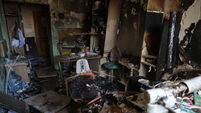Sat, 01 Oct, 2022 - 02:00
There is fear the “West” (US, UK, EU and Nato) will find itself between a rock and a hard place in the next few weeks. Russia has held its referendum; it is irrelevant whether the poll is valid or false.
The four provinces are within Russia’s possession, and have been declared integral parts of the Russian Federation. An ultimatum will likely be issued that any attack on these areas will be regarded as declaration of war against Russia itself.
Already a subscriber? Sign in
You have reached your article limit.
Subscribe to access all of the Irish Examiner.
Annual €130 €80
Best value
Monthly €12€6 / month
Introductory offers for new customers. Annual billed once for first year. Renews at €130. Monthly initial discount (first 3 months) billed monthly, then €12 a month. Ts&Cs apply.












